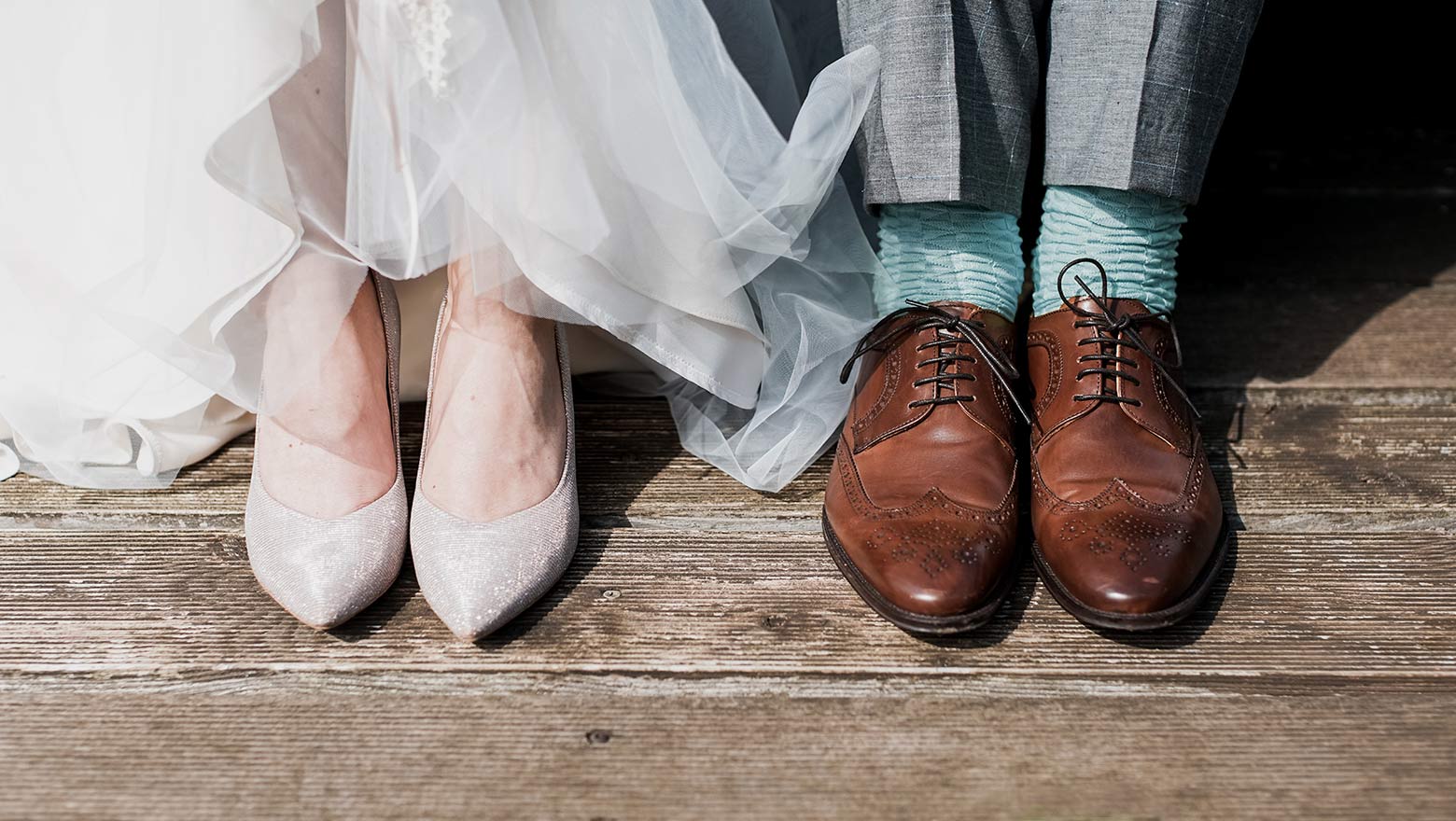Using the wedding cost calculator is easy. You’ll want to start using it once you’ve begun to explore possible costs of a venue, catering, florist, and so forth, and you’ll probably find yourself returning to it again and again as your event comes into sharper focus. Simply follow these steps:
1. Enter the Number of Guests
Some charges related to your wedding festivities will be determined based on the number of attendees. Costs related to catering, including bar and beverage costs, linens, and table settings will all be driven by the number of guests. It’s helpful to form a list of possible attendees early on, so you can get a rough headcount for the calculations.
2. Enter Your Wedding Budget
Your budget should be the total amount that you have to spend on your big event. This might be funds that you and your partner have saved up for your dream wedding, and it might or might not include money that will come from your families. Some soon-to-be-marrieds take out a personal loan or use credit cards to fund a portion of their event, or even the entire wedding.
3. Enter Line Item Costs
The wedding budget planner includes space where you can enter the cost of each line item related to your wedding, everything from the invitations you’ll send out six to eight weeks before the event to any favors your guests might take home at the end of the night. Every wedding is unique, so the calculator includes an “other” category to ensure that all expenses will be included.
4. Check Your Results
The calculator will show you the estimated total wedding cost and a budget comparison so you can see how your costs compare to your budget.
Understanding Your Estimated Total Wedding Cost
Your estimated total wedding cost is the sum of all the items you have input into the calculator. You can adjust the number of guests up and down to see how cutting or increasing the guest list by, say, 8 people changes your overall costs. If you are deciding between two venues, input the cost of each while holding the guest count constant and watch the estimated total wedding cost line to see how the cost changes based on your venue.
How to Compare Your Costs to Your Budget
The calculator also functions as a wedding budget planner, and a negative “budget comparison” number means you are over budget and may want to explore which costs you can lower. A positive number means you have wiggle room in your budget if other expenses arise.
With couples marrying later in life with each passing decade, according to Census data, more and more couples are paying for their nuptials with little or no help from mom and dad. The median age of a groom is 30.2 years and a bride is 28.6 years. Couples might be especially motivated to stay on budget when they know that any extra spending would probably eat into funds you want to use to set up your home together or save for future expenses, such as buying your first home.
Common Wedding Expenses to Consider
Many wedding expenses are similar to those for any other party: food and beverages, perhaps a party planner. But weddings can include special expenses: There’s the wedding dress and suit and other new clothing; lodging if the event is out of town; the wedding officiant’s honorarium or gift; presents for the wedding party; and special decorations for the altar or chuppah, for example. And of course, if you and your partner will wear wedding rings, you’ll want to factor that in.
This is a time for some couples to indulge their fantasies or create ’gram-worthy moments, from an over-the-top cocktail-hour sushi bar to custom-embroidered cocktail napkins. Some couples even hire a beer or bubbly burro, a good-luck donkey to bring beverages to guests.
Tips for Allocating Your Wedding Budget Across Categories
It helps to have a general idea of how to divvy up your wedding budget and where most of the money will go before you begin your planning. You can expect venue and catering costs to be the biggest budget category. Sometimes the venue provides the catering, and at other times food and beverage are provided by a separate caterer. Either way, you can expect the venue and catering, including beverages and rentals such as tables and tablecloths, to be about half your budget. Photos and video comprise about 10% of costs, while floral decor is another 9%, according to 2025 research by wedding website The Knot. Clothing and hair and makeup come in at 6% of the overall cost, while rings are 5% and the wedding planner is 4%. Other costs such as the band or DJ, stationery, or transportation for guests are all 3% or less.
Ways to Adjust Your Wedding Plan to Stay Within Budget
As with any budget, you’ll see the biggest change in the bottom line when you adjust the most significant expense category. In the case of a wedding, the venue and catering are usually the biggest expenses, and the catering and beverage cost is directly related to the number of guests. So adjusting your guest count, as noted above, is one way to stay on budget for a wedding.
If the wedding budget calculator is showing you’re over budget, you might look at affordable venue ideas to cut your costs. Think of the friend you know with the nicest home and backyard. Would they allow you to host your event at their home? Could you rent a pavilion at a city park or get married on a local beach and repair to a restaurant afterward? Is there a nearby brewery or family farm that could host your event? Given that the venue was more than a third of the wedding cost for couples in a recent SoFi wedding cost survey, reining in the location costs will take a load off your bottom line.
When a Personal Loan Might Help Cover Wedding Costs
In previous generations, rigid etiquette rules apportioned the costs associated with a wedding to the bride and groom’s family according to tradition. The bride’s family paid for most reception costs, for example. But today, many couples are paying for some or all of their big day, so one of the big decisions you’ll make on the cusp of life as a married couple is how to pay for a wedding.
More than a third of couples pay for the majority of their wedding expenses, and 13% pay for the entire thing. No surprise then, that it is also more common today for couples to take out a wedding loan or use other forms of credit to cover the costs. Some wedding venues even offer payment plans, knowing families might not have all the money they need up front. Over half of newlyweds surveyed by U.S. News had taken on debt for their wedding, and almost one in five couples (18%) had used a bank loan. A personal loan for a wedding has some advantages: The interest charged is often lower than that for a credit card. These loans are unsecured, so you don’t risk losing property if you can’t repay what you borrow, and they can be repaid in installments over several years.
Some couples take out a wedding loan and then use a portion of what guests give as cash gifts to repay the wedding debt (another portion could fund a relaxing honeymoon). In fact, discussing how you will use the money guests gift could be part of a larger conversation about the first financial plan you’ll make together as a couple. “It’s important to remember that ‘money talks’ are as much about listening as talking. Understanding each other’s values, goals, fears—and just getting on the same page—can help couples literally build their future together,” says Brian Walsh, CFP® and Head of Advice & Planning at SoFi.
The Takeaway
A wedding cost calculator can be a key tool that helps the two of you cement your partnership with a memorable celebration. Use the calculator to compare cost proposals from different venues, and raise or lower the number of guests to determine how the guest count will affect your bottom line. Get to a cost you’re comfortable with, exploring financing if necessary, and then sit back, relax, and enjoy the special party you’ve planned.
Think twice before turning to high-interest credit cards. Consider a SoFi personal loan instead. SoFi offers competitive fixed rates and same-day funding. See your rate in minutes.
SoFi’s Personal Loan was named NerdWallet’s 2024 winner for Best Personal Loan overall.
View your rate
FAQ
What is the average cost of a wedding?
The average cost of a wedding in the U.S. in 2025 is $36,000, according to research by the wedding planning site Zola. But costs can vary widely according to the size and style of wedding you choose and the cost of living in the part of the country (or world!) where you host your event.
One couple might spend less than $10,000 on a small wedding at a family home and another might shell out six figures for a no-expenses-spared celebration.
How can I figure out how much to spend on each part of my wedding?
Let your personal taste and budget guide you as you determine how much to spend on each aspect of your wedding. Use a wedding cost calculator to adjust your guest count or other fees up or down to figure out how the number of guests affects costs.
What do couples typically spend the most money on for weddings?
The venue and catering (including the beverage costs) are usually the largest portion of expenses in a wedding, comprising about half the budget.
How can I lower the cost of my wedding without sacrificing quality?
To lower the cost of your wedding while still hosting a gorgeous event, consider reducing the number of guests. You can use a wedding cost calculator to instantly see how this will help cut costs. You could also explore a less costly wedding venue, such as the home or garden of a friend or family member. Move from a Saturday-night event to a Friday or Sunday (Saturdays are often more expensive and in higher demand). Or consider a cocktail-style event rather than a seated dinner reception.
Can I use a personal loan to help pay for my wedding?
You can use a personal loan for a wedding, also called a wedding loan, to help cover the costs for your celebration, but it would be wise to have a plan in place to repay what you borrow. For example, rather than registering for every last kitchen utensil and shred of linens you might need for your new household, you might set up a honeymoon fund and invite guests to contribute.
Learn more about wedding costs.
SoFi Loan Products
SoFi loans are originated by SoFi Bank, N.A., NMLS #696891 (Member FDIC). For additional product-specific legal and licensing information, see SoFi.com/legal. Equal Housing Lender.
Third-Party Brand Mentions: No brands, products, or companies mentioned are affiliated with SoFi, nor do they endorse or sponsor this article. Third-party trademarks referenced herein are property of their respective owners.
Third Party Trademarks: Certified Financial Planner Board of Standards Center for Financial Planning, Inc. owns and licenses the certification marks CFP®, CERTIFIED FINANCIAL PLANNER®
Financial Tips & Strategies: The tips provided on this website are of a general nature and do not take into account your specific objectives, financial situation, and needs. You should always consider their appropriateness given your own circumstances.
SOPL-Q425-087
Browse other wedding guides.




